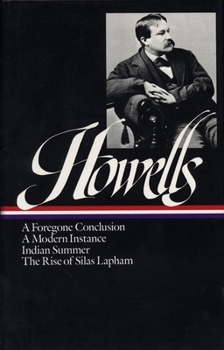William Dean Howells: Novels 1875-1886 (Loa #8): A Foregone Conclusion / Indian Summer / A Modern Instance / The Rise of Silas Lapham
The four novels collected in this Library of America volume are among the classic works from the immensely productive career of America's most influential man of letters at the turn of the twentieth century. William Dean Howells was a champion of French and Russian realistic writers and a brilliant advocate of the most controversial American writers of his own time. In A Foregone Conclusion (1875), a young American painter roams through...
Format:Hardcover
Language:English
ISBN:0940450046
ISBN13:9780940450042
Release Date:November 1982
Publisher:Library of America
Length:1217 Pages
Weight:1.70 lbs.
Dimensions:1.5" x 5.2" x 8.1"
Age Range:18 years and up
Grade Range:Postsecondary and higher
Customer Reviews
2 ratings
Great introduction to Howells
Published by Thriftbooks.com User , 16 years ago
William Dean Howells is one of those writers who everyone respects and recognizes as an important figure in American literature yet very few people read. This collection offers an excellent introduction. Four of Howells's greatest works are here. "A Foregone Conclusion" and "Indian Summer" are charming romances based in Italy. With the possible exception of James, there is no other male writer from the Gilded Age who captures American women better than Howells as the female leads from both novels show. Howells also offers some interesting social commentary on both Italy and America. Howells had a political background (he wrote offical biographies of both Lincoln and R.B.Hayes) and this is reflected in both novels. Both stories could be conventional romances; but with a skillful author like Howells, these tales are lifted to excellent studies of character, place, society and his times. "A Modern Instance" and "The Rise of Silas Lapham" are much more realistic and are set in the United States. They are also darker. Howell examines the newly rich, journalism, industry and the changes in the Republic during his life. He also continues to portray excellent characters. While these four novels are only a fraction of what Howells wrote (the man wrote over 100 books, including over 35 novels), they provide an excellent starting point. These books have quick plots, lovely images, memorable characters and offer insight into the human heart and into a distant past. The Library of America can be commended for its solid job in assembling this book. Both scholars and general readers will enjoy this collection.
realistic window into another literary age
Published by Thriftbooks.com User , 22 years ago
My friend Paul caught me reading this book and said "Wow, I'd have to believe that I was nearly immortal in order to read Howells." For the early 1880s, though, this is a pretty readable book. The ideas are familiar: "Money is to the fore now. It is the romance, the poetry of our age. It's the thing that chiefly strikes the imagination. The Englishmen who come here are more curious about the great new millionaires than about any one else, and they respect them more." (Rise of Silas Lapham)My favorite section from The Rise of Silas Lapham: "This comes of the error which I have often deprecated," said the elder Corey. "In fact I am always saying that the Bostonian ought never to leave Boston. Then he knows--and then only--that there can be no standard but ours. But we are constantly going away, and coming back with our convictions shaken to their foundations. One man goes to England, and returns with the conception of a grander social life; another comes home from Germany with the ntion of a more searching intellectual activity; a fellow just back from Paris has the absurdest ideas of art and literature; and you revert to us from the cowboys of Texas, and tell us to our faces that we ought to try Papa Lapham by a jury of his peers. It ought to be stopped--it ought, really. The Bostonian who leaves Boston ought to be condemned to perpetual exile." If these novels lack the genius of Edith Wharton or Henry James they provide a much more realistic view of American life circa 1880. You might not learn as much about the interior of the human heart but you'll learn something about how people got from place to place, furnished their houses, and managed businesses.






